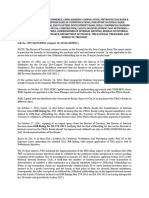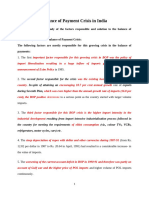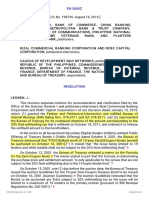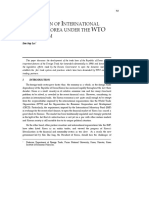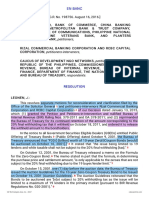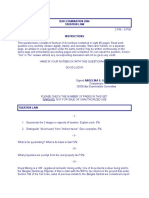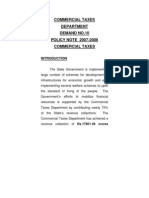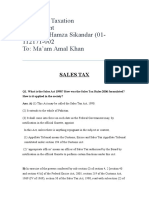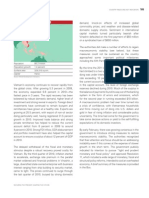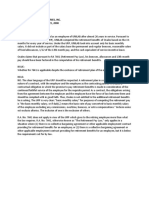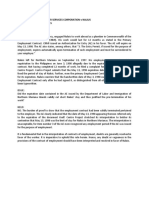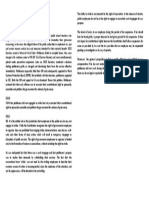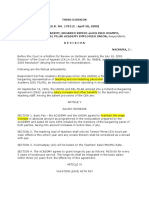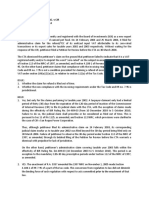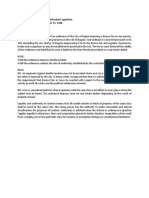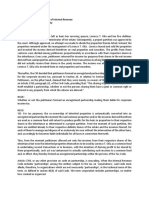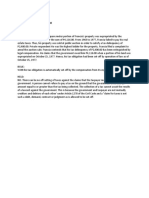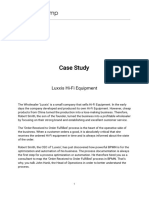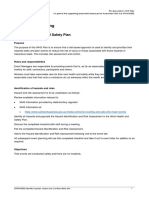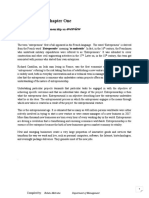3.1. Hijo Plantation V Central Bank - 1998 - Digest
3.1. Hijo Plantation V Central Bank - 1998 - Digest
Uploaded by
Kate GaroCopyright:
Available Formats
3.1. Hijo Plantation V Central Bank - 1998 - Digest
3.1. Hijo Plantation V Central Bank - 1998 - Digest
Uploaded by
Kate GaroOriginal Description:
Original Title
Copyright
Available Formats
Share this document
Did you find this document useful?
Is this content inappropriate?
Copyright:
Available Formats
3.1. Hijo Plantation V Central Bank - 1998 - Digest
3.1. Hijo Plantation V Central Bank - 1998 - Digest
Uploaded by
Kate GaroCopyright:
Available Formats
HIJO PLANTATION v CENTRAL BANK
G.R. No. L-34526 August 9, 1988
FACTS
Because of the difficulty in determining the peso-dollar exchange rate, Congress passed RA 6125 which imposed a
stabilization tax on exports, which gradually decreases over four years. The law enumerated covered products such
as logs, copra, centrifugal sugar and copper. Under Section 1, as a last provision, ―
Any export product the aggregate annual F.O.B. value of which shall exceed five million United States dollars in any
one calendar year during the effectivity of this Act shall likewise be subject to the rates of tax in force during the
fiscal years following its reaching the said aggregate value.
During the first 9 months of 1971, the total banana export exceeded the USD5m limit in RA 6125. Thus, the Central
Bank issued a Monetary Board Resolution imposing a stabilization tax on exports of bananas.
The resolution provided a rate of 6% for the first half of 1971 and 4% from July 1971 to last until June 1972.
The petitioner corporations were all engaged in production and exportation of bananas who paid the stabilization
taxes in protest and now assail the said resolution. Central Bank contends that the stabilization tax should be
imposed starting July 1971, the fiscal year following the calendar year where the industry reached USD 5m limit.
ISSUE
WON the Central Bank exceeded its powers in issuing the said Resolution
HELD
YES. There is no question that the export of bananas already reached the limit, bringing it under the coverage of RA
6125, and thus making the petitioners liable. However, the Central Bank, in issuing the resolution, acted in
overzealous desire to carry out the provisions of RA 6125. It acted beyond its authority under the said law. Thus,
where there is a discrepancy between the basic law and the regulation issued to implement the said law, the basic
law prevails and the regulation cannot go beyond the terms and provisions of the basic law.
You might also like
- Pretotype It 2nd Pretotype EditionDocument71 pagesPretotype It 2nd Pretotype EditionItzel RiveroNo ratings yet
- GULF AIR vs. CIRDocument3 pagesGULF AIR vs. CIRAlyssa Clarizze MalaluanNo ratings yet
- 004 - KINDS of EMPLOYEES - Philippine Span Asia Carriers V Pelayo - DigestDocument2 pages004 - KINDS of EMPLOYEES - Philippine Span Asia Carriers V Pelayo - DigestKate GaroNo ratings yet
- 004 - KINDS of EMPLOYEES - Philippine Span Asia Carriers V Pelayo - DigestDocument2 pages004 - KINDS of EMPLOYEES - Philippine Span Asia Carriers V Pelayo - DigestKate GaroNo ratings yet
- 001 - Kinds of Employees - Milan V NLRC - DigestDocument2 pages001 - Kinds of Employees - Milan V NLRC - DigestKate Garo100% (1)
- Camp John Hay Development Corp. v. CBAA, 706 SCRA 547 - THE LIFEBLOOD DOCTRINE - DigestDocument2 pagesCamp John Hay Development Corp. v. CBAA, 706 SCRA 547 - THE LIFEBLOOD DOCTRINE - DigestKate Garo100% (2)
- Cir v. Bpi, 521 Scra 373 - The Lifeblood Doctrine - DigestDocument1 pageCir v. Bpi, 521 Scra 373 - The Lifeblood Doctrine - DigestKate Garo100% (1)
- Business Plan Sample LLC PDFDocument37 pagesBusiness Plan Sample LLC PDFJaffar MemonNo ratings yet
- Hijo Plantation V Central BankDocument3 pagesHijo Plantation V Central BankKayee KatNo ratings yet
- Hijo Plantation V Central BankDocument3 pagesHijo Plantation V Central BankAiken Alagban LadinesNo ratings yet
- AdminDocument21 pagesAdminJohnny Castillo SerapionNo ratings yet
- Case Digest - Shell v. C.BDocument3 pagesCase Digest - Shell v. C.BLisle Arellano GolocanNo ratings yet
- Marcos and Duterte Regimes - An Analysis of Public Debt Structures, Financing Schemes, and Their Economic ImplicationsDocument6 pagesMarcos and Duterte Regimes - An Analysis of Public Debt Structures, Financing Schemes, and Their Economic ImplicationsBrenda MacarthyNo ratings yet
- BANCO DE ORO V REPUBLICDocument2 pagesBANCO DE ORO V REPUBLICJoanna Reyes100% (1)
- 2011 Kenya Budget NewsletterDocument9 pages2011 Kenya Budget NewsletterImran OsmanNo ratings yet
- Philippine Acetylen v. CIRDocument2 pagesPhilippine Acetylen v. CIRJemima FalinchaoNo ratings yet
- Export Proceeds Repatriation & Use - Further Tightening The Screws On ExportersDocument8 pagesExport Proceeds Repatriation & Use - Further Tightening The Screws On ExportersM Razid BlackNo ratings yet
- Social Economic ZoneDocument3 pagesSocial Economic ZoneRakesh Raj SinghaniayaNo ratings yet
- Overview of Ethiopian Excise Tax HCBST 2 PDFDocument13 pagesOverview of Ethiopian Excise Tax HCBST 2 PDFManickavasagam SubramanianNo ratings yet
- Introduction To FBRDocument19 pagesIntroduction To FBRMuhammad Nadeem Mughal0% (1)
- Special Economic ZxfxdonesDocument3 pagesSpecial Economic ZxfxdonesShIva Leela ChoUdaryNo ratings yet
- SBPDocument2 pagesSBPuswah zahidNo ratings yet
- FGIS 2022Document12 pagesFGIS 2022tvbptvNo ratings yet
- 12 Balance of Payment Crisis in IndiaDocument5 pages12 Balance of Payment Crisis in Indiadakshayaeni.bharadwajNo ratings yet
- April 5, 2016 PR Ad Hoc GO Bondholder Group Term SheetDocument5 pagesApril 5, 2016 PR Ad Hoc GO Bondholder Group Term SheetMiriam WarrenNo ratings yet
- Functions of FBR / Revenue DivisionDocument7 pagesFunctions of FBR / Revenue DivisionWajahat GhafoorNo ratings yet
- 04 BdoDocument43 pages04 BdoCheska VergaraNo ratings yet
- Budget Chemistry 2010Document44 pagesBudget Chemistry 2010Aq SalmanNo ratings yet
- Senate: First Regular SessionDocument3 pagesSenate: First Regular SessionBook WarmongerNo ratings yet
- R I T K WTO M: Egulation of Nternational Rade in Orea Under The EchanismDocument14 pagesR I T K WTO M: Egulation of Nternational Rade in Orea Under The EchanismBUINo ratings yet
- 2006 Bar ExaminationDocument11 pages2006 Bar ExaminationMaricar Corina CanayaNo ratings yet
- BDO Vs RepublicDocument53 pagesBDO Vs RepublicReena AlbanielNo ratings yet
- Taxation 06Document8 pagesTaxation 06BAROPSNo ratings yet
- 2016-Banco de Oro v. RepublicDocument43 pages2016-Banco de Oro v. RepublicPolo MartinezNo ratings yet
- Taxation Law: Chairperson 20006 Bar Examination CommitteeDocument5 pagesTaxation Law: Chairperson 20006 Bar Examination CommitteeSaporna LaarniNo ratings yet
- Banco de Oro vs. RepublicDocument2 pagesBanco de Oro vs. RepublicMJ BautistaNo ratings yet
- Imf ProgramDocument21 pagesImf ProgramAlkesh LundNo ratings yet
- Taxation of CompaniesDocument3 pagesTaxation of CompaniesJEBET RUTH KIPLAGATNo ratings yet
- An Go LaDocument7 pagesAn Go Lapierrechivi2875No ratings yet
- Bar Examination Taxation Law 2006-20015Document102 pagesBar Examination Taxation Law 2006-20015Joelito CalunodNo ratings yet
- Commissioner of Internal Revenue vs. Central Luzon Drug Corporation FactsDocument3 pagesCommissioner of Internal Revenue vs. Central Luzon Drug Corporation FactsKaren RonquilloNo ratings yet
- Taxation LawDocument3 pagesTaxation Lawfoxsmith8No ratings yet
- BANCO DE ORO Vs CIRDocument19 pagesBANCO DE ORO Vs CIRTrem GallenteNo ratings yet
- History of Income Tax in PakistanDocument37 pagesHistory of Income Tax in PakistanSoNaa BalochNo ratings yet
- Gulf Air Co-Phil Branch v. CIRDocument3 pagesGulf Air Co-Phil Branch v. CIRJustine GaverzaNo ratings yet
- Commercial Taxes-Tamil NaduDocument40 pagesCommercial Taxes-Tamil NaduharidasskNo ratings yet
- 126 Estanislao v. CostalesDocument3 pages126 Estanislao v. CostalesclarkorjaloNo ratings yet
- Bar Exam Qs Taxation LawDocument123 pagesBar Exam Qs Taxation LawUlysses100% (1)
- Amir Hamza Sikandar. 01-112171-002. Advanced Taxation AssignmentDocument6 pagesAmir Hamza Sikandar. 01-112171-002. Advanced Taxation AssignmentMehreen KhanNo ratings yet
- P Anualreports 1990 enDocument61 pagesP Anualreports 1990 enMunteanu SebiNo ratings yet
- Conwi vs. CTADocument10 pagesConwi vs. CTAcmv mendozaNo ratings yet
- Chapter 6 - Supplementary ProblemsDocument2 pagesChapter 6 - Supplementary ProblemsMichaela Francess Abrasado AbalosNo ratings yet
- IED Ch-6 Economic Reforms Since 1991Document30 pagesIED Ch-6 Economic Reforms Since 1991FUN FACTZNo ratings yet
- EAP Update March2011 VietnamDocument4 pagesEAP Update March2011 VietnamMc ElNo ratings yet
- Taxation Law Bar Questions 06-14Document49 pagesTaxation Law Bar Questions 06-14CarmeloNo ratings yet
- Nationalization of BanksDocument6 pagesNationalization of BanksHusain DadawalaNo ratings yet
- 2006 Bar Examination in Taxation LawDocument6 pages2006 Bar Examination in Taxation LawScarlette CooperaNo ratings yet
- Pakistan's Strategy For Navigating Fy2023 - Five Important FactsDocument4 pagesPakistan's Strategy For Navigating Fy2023 - Five Important FactsAhmed AliNo ratings yet
- BDO vs. R G.R. No. 198756Document33 pagesBDO vs. R G.R. No. 198756Ervien A. MendozaNo ratings yet
- BSP Functions, Roles and Sources of Funds BSP FunctionsDocument2 pagesBSP Functions, Roles and Sources of Funds BSP FunctionsAlice StarNo ratings yet
- A: Shall Come Into Force On 1 January, 2010 in Accordance With Paragraph 7, Article 12 of The Income Basic Tax ActDocument5 pagesA: Shall Come Into Force On 1 January, 2010 in Accordance With Paragraph 7, Article 12 of The Income Basic Tax ActSameer KumarNo ratings yet
- Sin Tax Reform in the Philippines: Transforming Public Finance, Health, and Governance for More Inclusive DevelopmentFrom EverandSin Tax Reform in the Philippines: Transforming Public Finance, Health, and Governance for More Inclusive DevelopmentNo ratings yet
- Regulatory Impact Analysis Report on the Current Customs Regulatory Framework in BangladeshFrom EverandRegulatory Impact Analysis Report on the Current Customs Regulatory Framework in BangladeshNo ratings yet
- FIRS Handbook on Reforms in the Tax System 2004-2011From EverandFIRS Handbook on Reforms in the Tax System 2004-2011No ratings yet
- 005 - KINDS of EMPLOYEES - Oxales V United Laboratories Inc - DigestDocument1 page005 - KINDS of EMPLOYEES - Oxales V United Laboratories Inc - DigestKate GaroNo ratings yet
- 006 - KINDS of EMPLOYEES - Centro Project Manpower Services Corpoaration V Naluis - DigestDocument1 page006 - KINDS of EMPLOYEES - Centro Project Manpower Services Corpoaration V Naluis - DigestKate GaroNo ratings yet
- 010 - MANAGEMENT PREROGATIVE - Industrial& Transport Equipment Inc V Tugade - DigestDocument1 page010 - MANAGEMENT PREROGATIVE - Industrial& Transport Equipment Inc V Tugade - DigestKate GaroNo ratings yet
- Eastern Telecommunications Phil Inc V CIR - DigestDocument1 pageEastern Telecommunications Phil Inc V CIR - DigestKate GaroNo ratings yet
- Bangalisan V Ca G.R. No. 124678 July 31, 1997 Regalado, J.: FactsDocument1 pageBangalisan V Ca G.R. No. 124678 July 31, 1997 Regalado, J.: FactsKate GaroNo ratings yet
- 003 - Kinds of Employees - Gma Network V Pabriga - DigestDocument2 pages003 - Kinds of Employees - Gma Network V Pabriga - DigestKate GaroNo ratings yet
- Bangalisan V Ca G.R. No. 124678 July 31, 1997 Regalado, J.: FactsDocument1 pageBangalisan V Ca G.R. No. 124678 July 31, 1997 Regalado, J.: FactsKate GaroNo ratings yet
- 015 - Del Pilar Academy vs. Del Pilar Academy Employees UnionDocument5 pages015 - Del Pilar Academy vs. Del Pilar Academy Employees UnionKate GaroNo ratings yet
- Miramar Fish Company, Inc. V Cir G.R. No. 185432, June 04, 2014 Perez, J.Document2 pagesMiramar Fish Company, Inc. V Cir G.R. No. 185432, June 04, 2014 Perez, J.Kate GaroNo ratings yet
- 002 - KINDS of EMPLOYEES - Fuji Television Network V Espiritu - DigestDocument5 pages002 - KINDS of EMPLOYEES - Fuji Television Network V Espiritu - DigestKate GaroNo ratings yet
- Team Energy Corporation V CIR - DigestDocument1 pageTeam Energy Corporation V CIR - DigestKate GaroNo ratings yet
- Asia International Auctioneers Inc V CIR - DigestDocument1 pageAsia International Auctioneers Inc V CIR - DigestKate GaroNo ratings yet
- Case No. 5 - Obillos V Commissioner of Internal Revenue - DigestDocument1 pageCase No. 5 - Obillos V Commissioner of Internal Revenue - DigestKate GaroNo ratings yet
- Procter & Gamble Asia Pte LTD V CIR - DigestDocument1 pageProcter & Gamble Asia Pte LTD V CIR - DigestKate GaroNo ratings yet
- Cir V Hantex Trading Co, Inc. G.R. NO. 136975: March 31, 2005 Callejo, SR., J.: FactsDocument2 pagesCir V Hantex Trading Co, Inc. G.R. NO. 136975: March 31, 2005 Callejo, SR., J.: FactsKate GaroNo ratings yet
- CITY OF BAGUIO V. FORTUNATO DE LEON, 25 SCRA 938 - PUBLIC PURPOSE - EQUAL PROTECTION - DigestDocument1 pageCITY OF BAGUIO V. FORTUNATO DE LEON, 25 SCRA 938 - PUBLIC PURPOSE - EQUAL PROTECTION - DigestKate GaroNo ratings yet
- BUSTAMANTE V CA - DigestDocument1 pageBUSTAMANTE V CA - DigestKate GaroNo ratings yet
- Cir V Hantex Trading Co, Inc. G.R. NO. 136975: March 31, 2005 Callejo, SR., J.: FactsDocument2 pagesCir V Hantex Trading Co, Inc. G.R. NO. 136975: March 31, 2005 Callejo, SR., J.: FactsKate Garo100% (2)
- Case No. 4 - Lorenzo Oña V Commissioner of Internal Revenue - DigestDocument1 pageCase No. 4 - Lorenzo Oña V Commissioner of Internal Revenue - DigestKate GaroNo ratings yet
- Case No. 2 - LIM TONG LIM vs. PHILIPPINE FISHING GEAR INDUSTRIES, INC. - Digest FattDocument2 pagesCase No. 2 - LIM TONG LIM vs. PHILIPPINE FISHING GEAR INDUSTRIES, INC. - Digest FattKate GaroNo ratings yet
- Case No. 1 - AURBACH V SANITARY WARE - Digest FattDocument2 pagesCase No. 1 - AURBACH V SANITARY WARE - Digest FattKate GaroNo ratings yet
- CIR v. Dash Engineering Phils., Inc., 712 SCRA 347 - THE LIFEBLOOD DOCTRINE - DigestDocument2 pagesCIR v. Dash Engineering Phils., Inc., 712 SCRA 347 - THE LIFEBLOOD DOCTRINE - DigestKate Garo100% (1)
- Phil. Guaranty Co., Inc. v. Cir, 13 Scra 775 - The Lifeblood Doctrine - DigestDocument2 pagesPhil. Guaranty Co., Inc. v. Cir, 13 Scra 775 - The Lifeblood Doctrine - DigestKate Garo100% (2)
- FRANCIA V. INTERMEDIATE APPELLATE COURT, ET AL., 162 SCRA 753 - TAX VS DEBT - DigestDocument1 pageFRANCIA V. INTERMEDIATE APPELLATE COURT, ET AL., 162 SCRA 753 - TAX VS DEBT - DigestKate GaroNo ratings yet
- YMCA v. CIR, 298 SCRA - THE LIFEBLOOD DOCTRINE - DigestDocument2 pagesYMCA v. CIR, 298 SCRA - THE LIFEBLOOD DOCTRINE - DigestKate GaroNo ratings yet
- Chapter 5 IAS 40 Investment PropertyDocument32 pagesChapter 5 IAS 40 Investment Propertyhuyst0512No ratings yet
- Case Study: Luxxis Hi-Fi EquipmentDocument4 pagesCase Study: Luxxis Hi-Fi EquipmentGelo Hitano de AlbaNo ratings yet
- Chapter 11 - Information Systems Management (Thuyet Trinh)Document42 pagesChapter 11 - Information Systems Management (Thuyet Trinh)phuongtran.31221025787No ratings yet
- Noise Hazard Identification ChecklistsDocument1 pageNoise Hazard Identification ChecklistsAimi AmaninaNo ratings yet
- Sitxwhs002 Whs PlanDocument6 pagesSitxwhs002 Whs PlanNish MigrationNo ratings yet
- 1-17 Aznar V CitibankDocument3 pages1-17 Aznar V CitibankreireiNo ratings yet
- Chapter 2 Fundamentals of IS SecurityDocument82 pagesChapter 2 Fundamentals of IS Securitytaye teferaNo ratings yet
- 08 PopeskoDocument13 pages08 PopeskoFahrur RozyNo ratings yet
- Cqa-Haccp: Sample Exam QuestionsDocument16 pagesCqa-Haccp: Sample Exam QuestionsKathyNo ratings yet
- Painting Supervision Work ContractDocument1 pagePainting Supervision Work ContractQuality Design & ConstructionNo ratings yet
- BUSINESS PLN Elitel Capital - Final UpdatedDocument44 pagesBUSINESS PLN Elitel Capital - Final UpdatedMotiram paudelNo ratings yet
- CH 1Document26 pagesCH 1amonNo ratings yet
- S-Curve-Case Study-Sessions 18&19Document10 pagesS-Curve-Case Study-Sessions 18&19g pragadishNo ratings yet
- 00 BPCL 41purchase RequisitionDocument704 pages00 BPCL 41purchase RequisitionDymac IndiaNo ratings yet
- Chapter 6 - Production Activity ControlDocument38 pagesChapter 6 - Production Activity ControlAinatul Alia AlliasNo ratings yet
- Titanium Alloy GuideDocument48 pagesTitanium Alloy GuidePatrick DominguezNo ratings yet
- Kajaria Ceramics Limited - 34 Annual General Meeting Conference CallDocument8 pagesKajaria Ceramics Limited - 34 Annual General Meeting Conference CallManish PatraNo ratings yet
- Entity ListDocument1 pageEntity ListRoldan WilfridoNo ratings yet
- MM Pricing SlidesDocument3 pagesMM Pricing SlidesVansh GuptaNo ratings yet
- Motorola Is An OldDocument2 pagesMotorola Is An OldJoshua DionisioNo ratings yet
- Analysis of Tokopedia Advertising #Dirumahajadulu and Its Correlativity To Tokopedia Branding Position in Pandemic EraDocument6 pagesAnalysis of Tokopedia Advertising #Dirumahajadulu and Its Correlativity To Tokopedia Branding Position in Pandemic EraYhaaNo ratings yet
- (Company Name) : Profit and Loss StatementDocument8 pages(Company Name) : Profit and Loss StatementRonald GarciaNo ratings yet
- Form PDF 679112700301221Document6 pagesForm PDF 679112700301221tejaprabhatcsNo ratings yet
- Principles of Accounting Lecture 1Document9 pagesPrinciples of Accounting Lecture 1Masum HossainNo ratings yet
- Assignment#2Document3 pagesAssignment#2Hassan MohyNo ratings yet
- Market Pulp Outlook: London Pulp Week November 2018Document17 pagesMarket Pulp Outlook: London Pulp Week November 2018Wagner V. Veríssimo (wvverissimo)100% (1)
- How Vietnamese Spend Their Free Time enDocument32 pagesHow Vietnamese Spend Their Free Time enminhanhchu.forworkNo ratings yet
- CBO Module 1 Retail Banking Deposit ProductsDocument17 pagesCBO Module 1 Retail Banking Deposit ProductsRajabNo ratings yet












